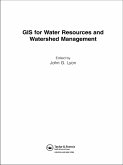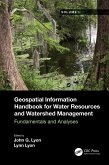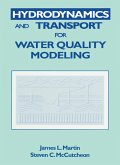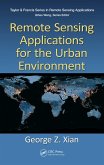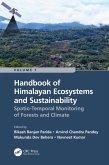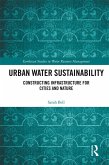Multiscale Hydrologic Remote Sensing (eBook, PDF)
Perspectives and Applications
Redaktion: Chang, Ni-Bin; Hong, Yang


Alle Infos zum eBook verschenken

Multiscale Hydrologic Remote Sensing (eBook, PDF)
Perspectives and Applications
Redaktion: Chang, Ni-Bin; Hong, Yang
- Format: PDF
- Merkliste
- Auf die Merkliste
- Bewerten Bewerten
- Teilen
- Produkt teilen
- Produkterinnerung
- Produkterinnerung

Hier können Sie sich einloggen

Bitte loggen Sie sich zunächst in Ihr Kundenkonto ein oder registrieren Sie sich bei bücher.de, um das eBook-Abo tolino select nutzen zu können.
Reflecting the current focus of hydrological sciences today, this color book discusses interdisciplinary issues in water resources research and remote sensing technology. It presents an exquisite arrangement of sensors, platforms, and problem-oriented features and covers all components of the hydrologic cycle, such as precipitation, soil moisture, evaporation, transpiration, lake and reservoir levels, terrestrial water storage, river discharge, and snow pack. Taking a multiscale approach, it addresses future concerns of hydrologic remote sensing under global change, including population…mehr
- Geräte: PC
- mit Kopierschutz
- eBook Hilfe
- Größe: 75.88MB
![GIS for Water Resource and Watershed Management (eBook, PDF) GIS for Water Resource and Watershed Management (eBook, PDF)]() GIS for Water Resource and Watershed Management (eBook, PDF)52,95 €
GIS for Water Resource and Watershed Management (eBook, PDF)52,95 €![Geospatial Information Handbook for Water Resources and Watershed Management, Volume I (eBook, PDF) Geospatial Information Handbook for Water Resources and Watershed Management, Volume I (eBook, PDF)]() Geospatial Information Handbook for Water Resources and Watershed Management, Volume I (eBook, PDF)121,95 €
Geospatial Information Handbook for Water Resources and Watershed Management, Volume I (eBook, PDF)121,95 €![Hydrodynamics and Transport for Water Quality Modeling (eBook, PDF) Hydrodynamics and Transport for Water Quality Modeling (eBook, PDF)]() James L. MartinHydrodynamics and Transport for Water Quality Modeling (eBook, PDF)141,95 €
James L. MartinHydrodynamics and Transport for Water Quality Modeling (eBook, PDF)141,95 €![Remote Sensing Applications for the Urban Environment (eBook, PDF) Remote Sensing Applications for the Urban Environment (eBook, PDF)]() George Z. XianRemote Sensing Applications for the Urban Environment (eBook, PDF)54,95 €
George Z. XianRemote Sensing Applications for the Urban Environment (eBook, PDF)54,95 €![Environmental Remote Sensing and Systems Analysis (eBook, PDF) Environmental Remote Sensing and Systems Analysis (eBook, PDF)]() Environmental Remote Sensing and Systems Analysis (eBook, PDF)64,95 €
Environmental Remote Sensing and Systems Analysis (eBook, PDF)64,95 €![Handbook of Himalayan Ecosystems and Sustainability, Volume 1 (eBook, PDF) Handbook of Himalayan Ecosystems and Sustainability, Volume 1 (eBook, PDF)]() Handbook of Himalayan Ecosystems and Sustainability, Volume 1 (eBook, PDF)60,95 €
Handbook of Himalayan Ecosystems and Sustainability, Volume 1 (eBook, PDF)60,95 €![Urban Water Sustainability (eBook, PDF) Urban Water Sustainability (eBook, PDF)]() Sarah BellUrban Water Sustainability (eBook, PDF)42,95 €
Sarah BellUrban Water Sustainability (eBook, PDF)42,95 €-
-
-
Dieser Download kann aus rechtlichen Gründen nur mit Rechnungsadresse in A, B, BG, CY, CZ, D, DK, EW, E, FIN, F, GR, HR, H, IRL, I, LT, L, LR, M, NL, PL, P, R, S, SLO, SK ausgeliefert werden.
- Produktdetails
- Verlag: Taylor & Francis eBooks
- Seitenzahl: 568
- Erscheinungstermin: 23. März 2012
- Englisch
- ISBN-13: 9781439877630
- Artikelnr.: 38303212
- Verlag: Taylor & Francis eBooks
- Seitenzahl: 568
- Erscheinungstermin: 23. März 2012
- Englisch
- ISBN-13: 9781439877630
- Artikelnr.: 38303212
- Herstellerkennzeichnung Die Herstellerinformationen sind derzeit nicht verfügbar.
Hydrologic Observatories. Local-Scale Hydrological Remote Sensing:
Advanced Ground Penetrating Radar for Soil Moisture Retrieval. Storm Impact
on the Coastal Geomorphology and Current Field by Wave Field Image
Sequences. Comparative Analysis of Surface Energy Balance Models for Actual
Evapotranspiration Estimation through Remotely Sensed Images. Thermal
Radiation and Energy Closure Assessment in Evapotranspiration Estimation
for Remote Sensing Validation. Urban-Scale Hydrological Remote Sensing:
Spatiotemporal Interactions between Soil Moisture, Vegetation Cover, and
Evapotranspiration in the Tampa Bay Urban Region, Florida. Developing a
Composite Indicator with Landsat Thematic Mapper/Enhanced Thematic Mapper
Plus Images for Drought Assessment in a Coastal Urban Region.
Watershed-Scale Hydrological Remote Sensing: Modeling Stream Flow Changes
with the Aid of Multisourced Remote Sensing Data in a Poorly Gauged
Watershed. MODIS-Based Snow Cover Products, Validation, and Hydrologic
Applications. Modeling Snowmelt Runoff under Climate Change Scenarios Using
MODIS-Based Snow Cover Products. Multispectral Satellite Data for Flood
Monitoring and Inundation Mapping. Regional-Scale Hydrological Remote
Sensing: Precipitation Estimate Using NEXRAD Ground-Based Radar Images:
Validation, Calibration, and Spatial Analysis. Radar Polarimetry for Rain
Estimation. Airborne Water Vapor Differential Absorption Lidar.
Continental- and Global-Scale Hydrological Remote Sensing: Global
Precipitation Estimation and Applications. Instantaneous Precipitation and
Latent Heating Estimation over Land from Combined Spaceborne Radar and
Microwave Radiometer Observations. Global Soil Moisture Estimation Using
Microwave Remote Sensing. Microwave Vegetation Indices from Satellite
Passive Microwave Sensors for Mapping Global Vegetation Cover. Remote
Sensing and Modeling of Global Evapotranspiration. Validation of Gravity
Recovery and Climate Experiment Data for Assessment of Terrestrial Water
Storage Variations. Remote Sensing of Soil and Vegetation Moisture from
Space for Monitoring Drought and Forest Fire Events. Index.
Hydrologic Observatories. Local-Scale Hydrological Remote Sensing:
Advanced Ground Penetrating Radar for Soil Moisture Retrieval. Storm Impact
on the Coastal Geomorphology and Current Field by Wave Field Image
Sequences. Comparative Analysis of Surface Energy Balance Models for Actual
Evapotranspiration Estimation through Remotely Sensed Images. Thermal
Radiation and Energy Closure Assessment in Evapotranspiration Estimation
for Remote Sensing Validation. Urban-Scale Hydrological Remote Sensing:
Spatiotemporal Interactions between Soil Moisture, Vegetation Cover, and
Evapotranspiration in the Tampa Bay Urban Region, Florida. Developing a
Composite Indicator with Landsat Thematic Mapper/Enhanced Thematic Mapper
Plus Images for Drought Assessment in a Coastal Urban Region.
Watershed-Scale Hydrological Remote Sensing: Modeling Stream Flow Changes
with the Aid of Multisourced Remote Sensing Data in a Poorly Gauged
Watershed. MODIS-Based Snow Cover Products, Validation, and Hydrologic
Applications. Modeling Snowmelt Runoff under Climate Change Scenarios Using
MODIS-Based Snow Cover Products. Multispectral Satellite Data for Flood
Monitoring and Inundation Mapping. Regional-Scale Hydrological Remote
Sensing: Precipitation Estimate Using NEXRAD Ground-Based Radar Images:
Validation, Calibration, and Spatial Analysis. Radar Polarimetry for Rain
Estimation. Airborne Water Vapor Differential Absorption Lidar.
Continental- and Global-Scale Hydrological Remote Sensing: Global
Precipitation Estimation and Applications. Instantaneous Precipitation and
Latent Heating Estimation over Land from Combined Spaceborne Radar and
Microwave Radiometer Observations. Global Soil Moisture Estimation Using
Microwave Remote Sensing. Microwave Vegetation Indices from Satellite
Passive Microwave Sensors for Mapping Global Vegetation Cover. Remote
Sensing and Modeling of Global Evapotranspiration. Validation of Gravity
Recovery and Climate Experiment Data for Assessment of Terrestrial Water
Storage Variations. Remote Sensing of Soil and Vegetation Moisture from
Space for Monitoring Drought and Forest Fire Events. Index.

